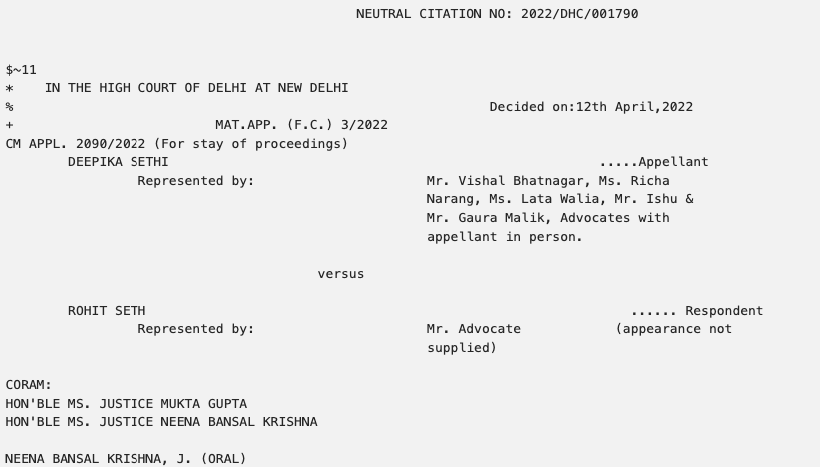Introduction
In a recent legal proceeding, the case of Deepika Sethi vs. Rohit Seth, decided on April 12, 2022, by the High Court of Delhi, drew significant attention. The bench comprising Justice Mukta Gupta and Justice Neena Bansal Krishna delved into the complex issues of spousal maintenance and equitable financial responsibility for child rearing in divorce cases.
Background
Deepika Sethi, a B.Tech in Civil Engineering with a substantial income, sought increased maintenance for herself and her daughter, Sarisha, from her estranged husband, Rohit Seth. The appeal was made against the decision of the Additional Principal Judge, Family Court, which denied her spousal maintenance but granted limited child support. Differences between Deepika and Rohit had led to their separation in 2019, and the primary custody of Sarisha had been with Deepika since then.
Key Arguments
Deepika challenged the lower court’s ruling primarily on the grounds that it underestimated Rohit’s financial capabilities. She argued that Rohit, being a director of M/S.Sysacme Private Limited and a sole proprietor of M/S Innate Infotech, had substantial undisclosed assets and income streams that should contribute towards the maintenance. Her appeal highlighted discrepancies in Rohit’s financial disclosures and emphasized his ability to afford higher maintenance, given his investments and income from international clients.
Court’s Observations
The court noted the apparent discrepancies in Rohit’s financial disclosures. Despite his claimed monthly income of ₹1,22,790, other significant assets and income sources were revealed, including shares, agricultural land, and a substantial investment in commercial property. The court recognized the need to reassess Rohit’s financial status to determine a fair maintenance settlement.
Court’s Decision
The court modified the previous order by enhancing the child maintenance to ₹35,000 per month, backdated to the original filing date of the maintenance application. The decision considered the lifestyle and needs of the child, aligning it with both parents’ financial status. The court emphasized that both parents share equal responsibility for their child’s upbringing, ensuring that the child’s welfare remains a priority despite the parents’ separation.
Conclusion
The High Court’s ruling in Deepika Sethi vs. Rohit Seth underscores the judiciary’s commitment to ensuring fair maintenance in divorce proceedings, particularly concerning child support. By adjusting the maintenance based on an accurate assessment of financial capabilities, the court upheld the principle that both parents are equally responsible for their child’s well-being, promoting a balanced approach to post-divorce family dynamics.
References: https://indiankanoon.org/doc/162685595/
